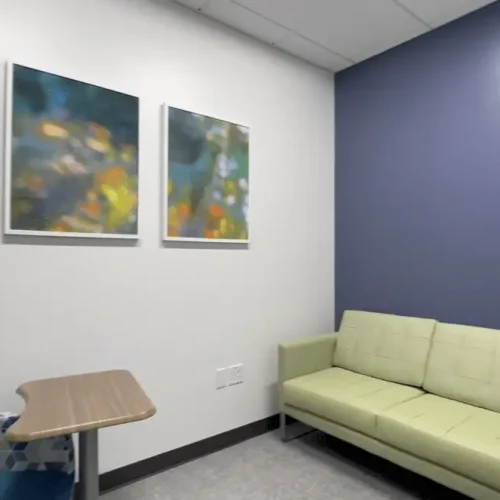Histrionic Personality Disorder (HPD) Treatment, Counseling, and Therapy Programs for Teens and Adolescents in Dallas, Texas
Histrionic personality disorder is classified as a “Cluster B” personality disorder, a group of conditions characterized by a dramatic personality and unpredictable behavior. It could indicate typical adolescent behavior if your teen demonstrates attention-seeking behaviors or emotional instability. Consulting with professionals in teen histrionic personality disorder treatment in Dallas, Texas, like BasePoint Academy, can provide clarity.
The team of personality disorder specialists at BasePoint Academy’s outpatient centers in Arlington, Forney, and McKinney is dedicated to supporting Texas youth’s mental health. Contact us today for a free assessment and to learn how to get treatment for teen histrionic personality disorder in Dallas, Texas. This page will provide an overview of the signs of histrionic personality disorder in teens and the effective mental health treatment methods for addressing this rare condition.
Understanding Histrionic Personality Disorder (HPD)
Histrionic Personality Disorder (HPD) is a mental health condition marked by excessive emotionality and a persistent need for approval. Individuals with HPD often display impulsiveness, superficial charm, and theatrical behavior to gain attention. These traits can affect relationships and daily functioning, making it crucial to effectively understand and address the disorder.
People with HPD may engage in manipulative or seductive behavior to maintain the spotlight, often prioritizing appearances over deeper connections. Their theatrical reactions and exaggerated emotions can create challenges in forming genuine relationships. Recognizing these patterns can render informed decisions regarding the behavioral health treatment needed to manage the disorder and improve your teen’s quality of life.
Histrionic personality disorder typically emerges in late adolescence or early adulthood. It’s more frequently diagnosed in women and individuals assigned female at birth. However, researchers believe it may be underdiagnosed in men and those assigned male at birth, suggesting a potential bias in recognition and diagnosis. Researchers estimate that only about 1% of people have histrionic personality disorder.
Insurance Coverage for Teen Histrionic Personality Disorder
Our complimentary assessment with a licensed clinician will recommend the appropriate level of care for your teen struggling with histrionic personality disorder. We can also check your insurance coverage levels.
Call us today to schedule a complimentary same-day assessment at (972) 357-1749 or complete our inquiry form.
Teen Histrionic Personality Disorder Treatment Admissions
Contact BasePoint Academy Today
Contact us today to schedule a free confidential assessment for your teen with a licensed clinician.
You can also get in touch to talk with our mental health experts about treatment needs, care options and your insurance coverage levels.
Call: (972) 357-1749Check Your InsuranceWhat Are the Causes of Histrionic Personality Disorder in Teens?
The causes of histrionic personality disorder in teens are often linked to a combination of genetics and environmental factors, according to the Cleveland Clinic. Teens may develop this condition due to a family history of personality disorders, inconsistent parenting, or early experiences that reinforce manipulative behavior as a way to gain attention or approval.
These influences can shape how a teen processes emotions and interacts with others, leading to attention-seeking patterns through dramatic or excessive emotional displays. Over time, this learned theatrical behavior may become ingrained as a coping mechanism. Understanding these underlying causes can help families like yours support teens in addressing histrionic personality disorder through talk therapy and healthy relationship-building.
What Are the Types of Teen Histrionic Personality Disorder (HPD)?
Teen Histrionic Personality Disorder (HPD) can manifest in various ways, reflecting different patterns of behavior and emotional expression. While every individual is unique, there are common examples of how HPD might appear in teens. These examples are not exhaustive but provide insight into the range of behaviors associated with this condition.
Inhibited HPD
Inhibited histrionic personality disorder is characterized by a mix of excessive emotionality and a reluctance to express it openly. Teens with this type may seek attention subtly, appearing naïve. They use manipulative behavior to gain approval without drawing direct focus. They often appear reserved and emotionally unavailable but still crave validation, which can lead to internal conflict and strained relationships.
Disingenuous HPD
Disingenuous histrionic personality disorder involves a pattern of superficial charm and manipulative behavior. Teens with this type may use exaggerated emotions or false sincerity to gain approval or influence others. Beneath their outwardly engaging demeanor, they might struggle with authenticity, making it challenging to build genuine, trusting relationships over time.
Infantile HPD
Childlike behaviors and a constant need for attention characterize infantile histrionic personality disorder. Teens with this type may display regressive actions, seeking approval through dramatic emotional outbursts or seeking to be the center of attention in an immature way. This can make it challenging for them to form healthy, age-appropriate relationships.
Tempestuous HPD
Intense emotional swings and unpredictable behavior mark tempestuous histrionic personality disorder. Teens with this type may experience dramatic mood shifts and engage in attention-seeking actions, such as outbursts or exaggerated reactions, to draw focus. Their volatile emotions can create turmoil in relationships, as they often struggle to regulate their feelings and maintain stability in their interactions with others.
Theatrical HPD
Theatrical histrionic personality disorder is characterized by dramatic, attention-seeking behavior and a strong desire to be the center of attention. Teens with this type are fixated on physical appearance and may engage in excessive emotionality, using theatrical gestures or speech. Their need for approval often drives them to create scenes or act in ways that feel larger than life.
Vivacious HPD
Vivacious histrionic personality disorder involves vibrant, outgoing personalities paired with a constant need for attention. Teens with this type may appear lively and engaging, using charm and energy to captivate those around them. However, beneath their exuberance lies a deep desire for validation, often leading them to manipulate situations or overstate their emotions to maintain the spotlight and gain approval.
Appeasing HPD
Appeasing histrionic personality disorder involves a tendency to please others in exaggerated ways for attention. Teens with this type often go out of their way to avoid conflict, using charm and submissive behavior to maintain relationships. While they may appear warm and accommodating, their actions are often motivated by a need for validation, leading them to suppress their true feelings.
What Are the Signs and Symptoms of Histrionic Personality Disorder (HPD) in Teens and Adolescents?
Histrionic personality disorder in teens and adolescents can be challenging to recognize, as the signs and symptoms often overlap with typical teenage behavior. However, there are distinct patterns that can indicate the presence of this disorder. Understanding what to look out for is key to identifying whether your teen might be struggling with histrionic personality disorder.
Some common signs of histrionic personality disorder in teens include excessive emotionality and a need to be the center of attention. These teens may engage in dramatic or theatrical behavior, exaggerating emotions to draw focus from those around them. They might become upset or withdrawn when they feel overlooked or ignored. Impulsiveness is another symptom of histrionic personality disorder, with teens often acting without thinking to maintain attention or validation.
Other symptoms of histrionic personality disorder to watch for include manipulative behavior. Teens might use seduction to influence others or display superficial charm, lacking depth. Teens with histrionic personality disorder may also engage in attention-seeking behavior, such as dressing provocatively or creating dramatic situations to stay in the spotlight. Additionally, they may struggle to maintain stable relationships due to their emotional volatility and desire for constant reassurance.
If you notice your teen consistently displaying these patterns—such as exaggerated emotional responses, attention-seeking actions, or an ongoing need for approval—it may be a sign of histrionic personality disorder. Seeking professional counseling services can offer valuable guidance for managing these symptoms and supporting your teen in building healthier relationships and coping skills.

What Types of Programs Are Available for Teen Histrionic Personality Disorder Treatment in Dallas, Texas?
In Dallas, Texas, several effective treatment options are available for teens with histrionic personality disorder. These programs address teenagers’ unique challenges, offering support and tools for healthier emotional regulation and relationships. Options include day treatment programs, holistic therapy programs focusing on overall well-being, teletherapy for convenience, remote care, and the following alternatives.
Outpatient Program for Teen Histrionic Personality Disorder
An outpatient program for histrionic personality disorder treatment offers flexible, effective care while allowing teens to maintain their daily routines. These programs often include individual therapy, where teens can work one-on-one with a therapist to explore the underlying causes of their behavior, develop emotional regulation skills, and build healthier coping mechanisms.
This approach helps teens address excessive emotionality or attention-seeking behavior in a supportive environment. Outpatient care is ideal for those who don’t require round-the-clock supervision but still benefit from structured, professional guidance tailored to their needs.
Partial Hospitalization for Teen HPD
Partial hospitalization programs provide intensive support for teens with histrionic personality disorder while allowing them to return home each evening. These programs are ideal for teens who need more structured care than outpatient therapy but do not require inpatient treatment.
Through a combination of individual therapy, group sessions, and skill-building activities, partial hospitalization programs help teens address emotional challenges, reduce manipulative behaviors, and develop healthier ways to seek validation. This level of care ensures teens receive comprehensive mental health treatment while staying connected to their family and daily environment.
Intensive Outpatient for Adolescent Histrionic Personality Disorder
An Intensive Outpatient Program (IOP) is an excellent option for teens with histrionic personality disorder who need structured care while maintaining their regular routines. These programs often include individual and group therapy, where teens can share experiences, practice social skills, and learn from their peers in a supportive setting.
However, group therapy isn’t typically recommended for histrionic personality disorder because symptoms like attention-seeking and exaggeration may intensify in group settings. Nevertheless, an IOP provides the flexibility and guidance necessary for meaningful progress, and a treatment plan will be developed that coincides with your teen’s specific needs.
Residential Treatment for Teen Histrionic Personality Disorder
Residential treatment offers a highly structured and supportive environment for teens with histrionic personality disorder who need intensive care. In this setting, teens receive around-the-clock support from mental health professionals, allowing them to address deep-seated patterns like excessive emotionality or manipulative behavior in a focused way.
This level of care often includes individual therapy, group sessions, and tailored activities to help teens develop healthier coping mechanisms and emotional regulation skills. Residential treatment provides a safe space for teens to step away from daily stressors and focus 24/7 on their mental health and personal growth.
What Types of Therapies Are Available for Teen Histrionic Personality Disorder Therapy in DFW?

Teens with histrionic personality disorder in the Dallas-Fort Worth (DFW) area have access to various therapeutic options tailored to their unique needs. These therapies focus on addressing emotional challenges and building healthier coping mechanisms. From mental health counseling to emotional support therapy, each of these examples highlights the diverse support options in the region. Call (972) 357-1749 to learn more.
Cognitive Behavioral Therapy (CBT)
Cognitive Behavioral Therapy (CBT) is a highly effective approach for teens with histrionic personality disorder. This therapy helps teens identify and challenge negative thought patterns that drive excessive emotionality or attention-seeking behavior. By learning healthier ways to manage emotions and build self-esteem, teens can develop more balanced, positive relationships.
Psychodynamic Therapy
Psychodynamic therapy explores the unconscious factors influencing teens’ behavior and emotional responses. This therapy encourages self-reflection and insight by uncovering past experiences and underlying conflicts, helping teens understand the roots of their attention-seeking or emotional patterns. This deeper understanding facilitates healthier coping mechanisms and more authentic connections with others.
Mindfulness and Meditation
Mindfulness-based therapy incorporates mindfulness and meditation techniques to help teens with histrionic personality disorder develop emotional awareness and self-regulation skills. By practicing mindfulness, teens can learn to manage impulsiveness and reduce excessive emotional reactions. This calming, focused approach encourages healthier coping strategies and emotional stability while helping them build a stronger sense of inner balance.
Music and Art Therapy
Music and art therapy offer creative outlets for teens with histrionic personality disorder to express their emotions and explore their inner thoughts. These therapies encourage self-discovery and emotional regulation in a nonjudgmental environment. By engaging in creative processes, teens can develop healthier ways to process feelings and improve their overall emotional well-being.
Dialectical Behavior Therapy (DBT)
Dialectical Behavior Therapy (DBT) focuses on managing intense emotions and reducing impulsiveness. Through DBT, teens learn skills like emotional regulation, mindfulness, and distress tolerance, helping them handle challenging situations more effectively. This therapy promotes healthier behaviors and stronger relationships by teaching practical tools for emotional balance.
Transference-Focused Psychotherapy (TFP)
TFP explores how past relationships shape teens’ emotions and behaviors. By examining these patterns in the context of the therapeutic relationship, teens can gain insight into their emotional needs and develop healthier ways to interact with others. This deep, reflective approach fosters growth and self-awareness.
Acceptance and Commitment Therapy (ACT)
Acceptance and Commitment Therapy (ACT) helps teens with histrionic personality disorder embrace their emotions without judgment while focusing on their core values. This therapy encourages teens to develop self-acceptance and commit to actions that align with their goals. ACT reduces the need for external validation and fosters a sense of personal fulfillment.
BasePoint Academy Accepts health Insurance
We accept most major health insurance providers in Texas and can check your treatment coverage levels on your behalf.
Therapy and Treatment for HPD at BasePoint Academy
BasePoint Academy operates a handful of treatment centers in the Dallas area. Our programs are tailored to meet the unique needs of adolescents, providing specialized therapy that supports emotional growth, self-awareness, and the development of stronger, more positive relationships. We are dedicated to equipping teens with the tools to navigate their emotions and foster healthier connections with others.
- Arlington, Texas: 3900 Arlington Highlands Blvd, Suite 237, Arlington, TX 76018
- Forney, Texas: 713 W Broad St, Suite 200, Forney, TX 75126
- Frisco, Texas: 8275 Judges Way, Suite 100I, Frisco, TX 75036
- McKinney, Texas: 4733 Medical Center Drive, McKinney, TX 75069

Teen HPD Treatment Program in Arlington, Texas
Arlington, Texas, provides an ideal mix of a close-knit community and access to exceptional treatment for histrionic personality disorder. Its family-friendly vibe and proximity to Dallas offer the best of both a cozy, small-town environment and the convenience of urban amenities. It’s a welcoming place for both recovery and everyday living.
- BasePoint Academy – Arlington, Texas: 3900 Arlington Highlands Blvd, Suite 237, Arlington, TX 76018, United States
Teen HPD Treatment Program in Forney, Texas
Forney, Texas, is a growing city with a welcoming, small-town feel, making it a great place to seek mental health treatment for personality disorders. Located just east of Dallas, Forney is celebrated for its historic charm as the “Antique Capital of Texas,” offering serene parks and open spaces. This calm, peaceful setting provides an ideal backdrop for both recovery.
- BasePoint Academy – Forney, Texas: 713 W Broad St, Suite 200, Forney, TX 75126, United States
Teen HPD Treatment Program in McKinney, Texas
McKinney, Texas, is known for its perfect combination of historic charm, beautiful parks, and a family-oriented environment. The city offers a cozy, small-town feel with the perks of modern amenities, including a vibrant downtown filled with local shops and restaurants. Just north of Dallas, McKinney provides a peaceful atmosphere ideal for receiving specialized care for histrionic personality disorder.
- BasePoint Academy – McKinney, Texas: 4733 Medical Center Drive, McKinney, TX 75069, United States
Alternative Ways to Find Teen Histrionic Personality Disorder Treatment Near Me
Recovery from personality disorders often involves finding the proper care, and teen histrionic personality disorder treatment in Dallas, Texas, is not one-size-fits-all. As mental health advocates for Texas youth, we’re dedicated to facilitating the right mental health treatment for your teen’s needs. We’ve created this step-by-step guide to finding histrionic personality disorder treatment in Dallas, Texas, and beyond:
- Online Research: Search terms like “teen histrionic personality disorder treatment near me” to locate relevant centers.
- Mental Health Directories: Use platforms like SAMHSA, Psychology Today, GoodTherapy, or TherapyDen to search for local providers specializing in personality disorders.
- Referrals: Consult your teen’s doctor, mental health professionals, or trusted family and friends for recommendations.
- Insurance Provider: Request a list of in-network treatment centers specializing in histrionic personality disorder from your insurer. In-network providers are often more affordable.
- Local Directories: Explore community health resources and directories for nearby mental health clinics.
- Social Media: Use online forums or local Facebook groups for personal recommendations and insights.
- Universities: Behavioral health clinics at universities or medical schools may offer specialized care at lower costs.
- Reviews: Check online reviews to gauge the reputation and experiences at various centers.
What Is the BasePoint Difference?

7am to 7pm CST
7 Days a Week

Full Time Physican
On Site

We Transport
To and From

Therapy Involving
the Whole Family

Family
Owned

Contact BasePoint Academy Today
Contact us today to schedule a free confidential assessment for your teen with a licensed clinician.
You can also get in touch to talk with our mental health experts about treatment needs, care options and your insurance coverage levels.
Call: (972) 357-1749Check Your InsuranceDoes Health Insurance Cover Teenage Histrionic Personality Disorder Therapy and Treatment in Texas?
Yes, many health insurance plans in TX cover teenage histrionic personality disorder treatment and therapy. Coverage can vary depending on your plan, but most plans will help pay for essential services like individual therapy, group therapy, and specialized treatment modalities like trauma therapy. Be sure to check your insurance policy to understand the specific coverage details.
To check your insurance benefits, you can contact BasePoint Academy. We’ll clarify your coverage so you can make informed decisions regarding your teen’s care while aligning with your budget. This clarification will also negate unexpected out-of-pocket costs.

Which Health Insurance Providers Cover HPD Therapy and Treatment for My Teen Child?
Several major health insurance providers in Texas offer coverage for teenage histrionic personality disorder treatment. Some of the most common providers include Blue Cross Blue Shield of Texas, Aetna, Optum, Magellan, and UnitedHealthcare. These plans often include coverage for individual therapy, group therapy, and outpatient programs.
It’s important to verify your benefits for mental health services. Each plan may have different coverage levels and requirements for therapy and treatment programs. By reviewing your options with your insurer or a healthcare provider like BasePoint Academy, you can ensure your teen receives the necessary care and support for managing histrionic personality disorder.
How Much Does Teen Histrionic Personality Disorder Treatment and Therapy Cost with Health Insurance in Texas?
The cost of treating histrionic personality disorder with health insurance can be much more manageable than paying out-of-pocket. Many insurance plans require only copayments, deductibles, or coinsurance, with therapy session costs typically ranging between $20 and $100, depending on your specific coverage and program.
To reduce expenses, verify if the treatment program is in-network under your health plan. Coverage may extend to outpatient therapy, partial hospitalization, or other care options, though some plans may have limitations. Connecting with a mental healthcare provider, like BasePoint Academy, can clarify coverage details and help you prepare for any financial responsibilities.
How Much Does Adolescent Histrionic Personality Disorder Treatment and Therapy Cost Without Health Insurance?
The cost of treating histrionic personality disorder without health insurance can vary widely depending on the program type and location. Outpatient therapy typically costs between $100 and $250 per session, while intensive options like day treatment or partial hospitalization programs may run several thousand dollars monthly.
These expenses can quickly accumulate, especially given the time needed to address personality disorders effectively. Costs are influenced by factors such as the treatment center’s reputation, care intensity, and program customization. Exploring payment options, sliding scale fees, or financing plans can help make treatment more accessible if uninsured.
Contact BasePoint Academy Today
Contact us today to schedule a free confidential assessment for your teen with a licensed clinician.
You can also get in touch to talk with our mental health experts about treatment needs, care options and your insurance coverage levels.
Call: (972) 357-1749Check Your InsuranceWhat to Expect from the Admissions Process for HDP Treatment at BasePoint
The admissions process for teen histrionic personality disorder treatment in Dallas, Texas, at BasePoint Academy ensures personalized support and comprehensive care. It’s designed to be as seamless and worry-free as possible. While the process may vary from one admittance to the next, here’s an overview of the steps involved:
- Initial Contact: Contact our admissions team to discuss your teen’s needs, explain treatment options, and determine if our programs are the right fit.
- Assessment and Evaluation: Your teen will undergo a detailed evaluation to identify emotional challenges and behavior patterns, allowing us to develop a customized treatment plan.
- Insurance Verification: We assist with verifying insurance coverage, helping you understand financial details, including out-of-pocket costs for mental health counseling services and other treatments.
- Treatment Plan Development: Based on the assessment, our team crafts a personalized plan that targets your teen’s specific needs and therapy goals.
- Admissions Coordination: We streamline the process, ensuring that documentation is complete and that transitions into the program are smooth.
- Orientation and Program Start: Your teen is welcomed into a supportive environment, introduced to staff, and provided with an overview of therapeutic approaches.
- Active Treatment Participation: Through individual therapy, your teen learns healthier coping skills and addresses symptoms of histrionic personality disorder.
- Progress Monitoring: Regular updates and adjustments to the treatment plan ensure ongoing support and communication throughout their path to recovery.
Confidential and Free Histrionic Personality Disorder Assessments in Dallas, Texas
If you’re concerned your teen may be exhibiting signs of histrionic personality disorder, a professional assessment is the first step toward understanding their needs. Confidential, free evaluations are available at BasePoint Academy to help you gain clarity about your child’s challenges. These assessments provide valuable insights into the most effective path forward for your child’s mental health and overall well-being.
Take the first step today by reaching out to us. Our compassionate team is here to answer your questions, provide guidance, and help your teen access the support they need. Don’t wait to get the answers and assistance your family deserves. Call (972) 357-1749 to schedule a free, confidential assessment.

Contact The BasePoint Academy Today!
Has your teen exhibited histrionic personality disorder symptoms? If you are concerned about your teenager’s mental health, contact BasePoint Academy for an assessment and a personalized treatment plan.
Sources
- World Health Organization. (n.d.). Mental health of adolescents. World Health Organization. Retrieved from https://www.who.int/news-room/fact-sheets/detail/adolescent-mental-health on July 11, 2023
- Horowitz, J. M. (2019, February 20). Most U.S. teens see anxiety and depression as a major problem among their peers. Pew Research Center’s Social & Demographic Trends Project. Retrieved from https://www.pewresearch.org/social-trends/2019/02/20/most-u-s-teens-see-anxiety-and-depression-as-a-major-problem-among-their-peers/ on July 11, 2023
Histrionic Personality Disorder Therapy and Treatment Statistics and Info for Texas Families
- According to the Cleveland Clinic, histrionic personality disorder is considered uncommon, affecting approximately 1% of the population.
- Cluster B personality disorders, including histrionic, antisocial, borderline, and narcissistic, are characterized by dramatic, erratic behaviors, impulsivity, emotional instability, and difficulty maintaining relationships.
- Around 65% of histrionic personality disorder diagnoses occur in females, with no known racial or ethnic predisposition.
- Individuals with histrionic personality disorder are often diagnosed after seeking therapy for depression or anxiety, typically following a problematic relationship or personal conflict.
- Histrionic personality disorder often co-occurs with several other mental health conditions, including borderline personality disorder, dependent personality disorder, eating disorders, narcissistic personality disorder, and substance use disorder.
- According to Foundations of the Mind, Brain, and Behavioral Relationships, there is a significant link between neurotransmitter function and histrionic personality disorder.
- A study involving 159 individuals with histrionic personality disorder found that clarification-oriented psychotherapy effectively reduced symptoms and enhanced relationship dynamics.
- Mindfulness-based practices like yoga, tai chi, and biofeedback can benefit those with personality disorders by helping them manage inner emotions while reducing impulsiveness and emotional reactivity.







